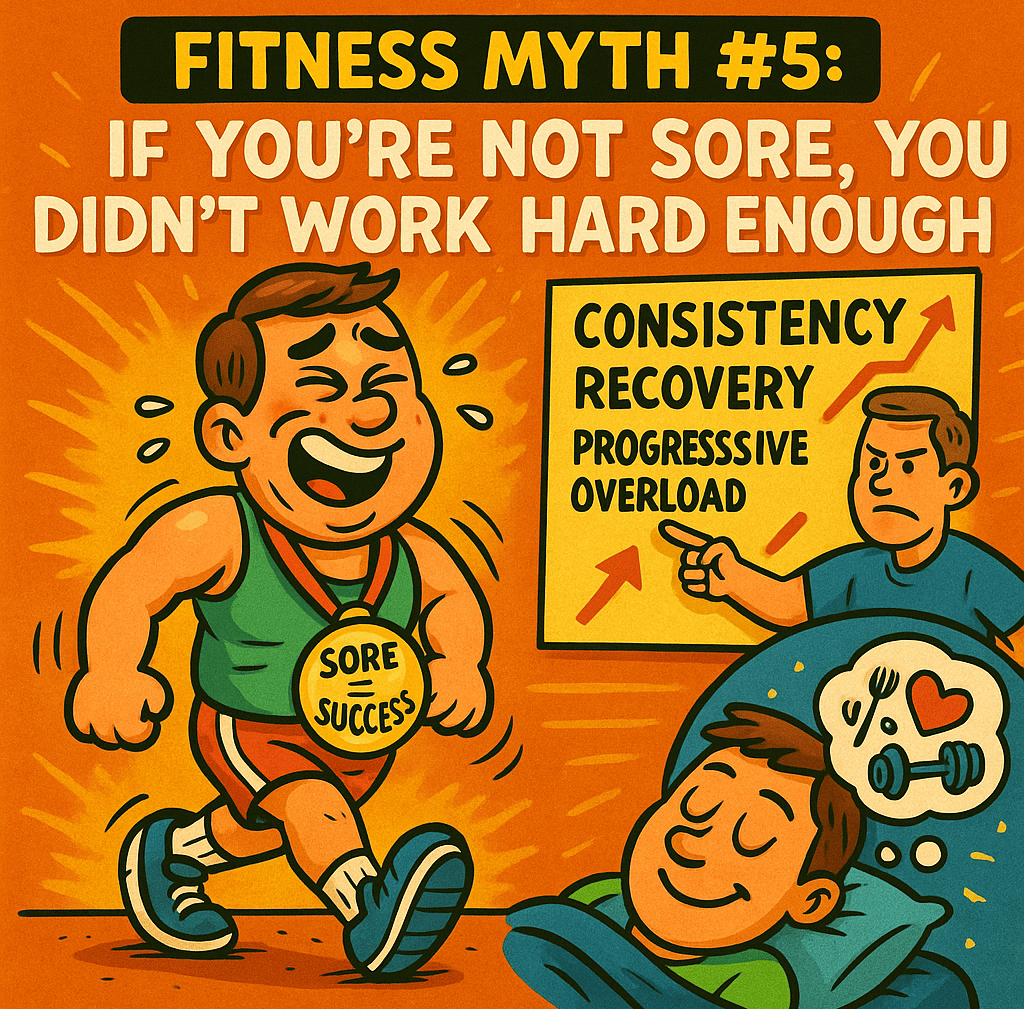Fitness Myth #5: If You’re Not Sore, You Didn’t Work Hard Enough
Many think muscle soreness means success, but progress comes from recovery, consistency, and progressive overload — not walking like a penguin after leg day.
FITNESS
Adi English
2 min read


🏋️ Fitness Myth #5: “If You’re Not Sore, You Didn’t Work Hard Enough”
📖 Article (~370 words)
Many people believe that muscle soreness is the ultimate proof of a good workout. If your legs don’t feel like jelly the next day, some think you wasted your time. But soreness isn’t the same as progress. If that were true, carrying groceries up the stairs would turn you into a superhero.
Soreness happens when muscle fibers experience micro-tears from a new or intense activity. Your body repairs these fibers, making them stronger. But soreness is influenced by novelty, not just effort. Doing a brand-new exercise, even with light weight, can leave you sore. Meanwhile, repeating your usual heavy lifts may not hurt as much, yet you’re still building strength.
The real key to growth is progressive overload — gradually adding more weight, reps, or intensity. That’s what drives adaptation, not chasing pain. Recovery is equally important: rest, sleep, and nutrition give your body the chance to heal and grow. Without recovery, soreness is just damage, not progress.
Consistency is also more valuable than pain. Training regularly, managing your intensity, and avoiding overtraining ensure you make progress without burning out. Walking like a penguin after every leg day might look funny, but it’s not a long-term strategy.
Takeaway: Soreness is not a badge of honor. It can happen when you challenge your body in new ways, but it’s not the best way to measure progress. Strength, performance, and consistency are the real markers of improvement.
🗂 Vocabulary
Muscle soreness – pain after working out.
Example: My legs had muscle soreness after squats.
Student example: _________
Fibers – small parts inside muscles.
Example: Exercise can damage muscle fibers.
Student example: _________
Micro-tears – tiny damage in muscle after exercise.
Example: Micro-tears help muscles grow back stronger.
Student example: _________
Recovery – rest and healing after training.
Example: Sleep is important for recovery.
Student example: _________
Progressive overload – slowly adding more weight or reps.
Example: Progressive overload makes muscles grow.
Student example: _________
Consistency – doing something regularly.
Example: Consistency is key for results.
Student example: _________
Intensity – how hard you exercise.
Example: High intensity can make workouts challenging.
Student example: _________
Overtraining – exercising too much without enough rest.
Example: Overtraining can cause injuries.
Student example: _________
Badge of honor – something people brag about.
Example: Soreness is not a badge of honor.
Student example: _________
Penguin – a funny way to walk when sore.
Example: I walked like a penguin after leg day.
Student example: _________
📝 Exercises
Comprehension
Why do people believe soreness means progress?
What actually causes soreness?
What role does progressive overload play in growth?
Why is recovery important after training?
What is the main takeaway of the article?
Multiple Choice
What causes muscle soreness?
a) Micro-tears b) Calories c) Sleep d) Protein
What is progressive overload?
a) Adding weight/reps b) Eating more food c) Stretching d) Resting
What is more important than soreness for progress?
a) Consistency b) Pain c) Complaining d) Sweating
What can happen from overtraining?
a) Burnout b) Stronger abs c) Faster growth d) Nothing
What is soreness NOT?
a) Proof of progress b) Caused by novelty c) Pain in muscles d) A badge of honor
Fill in the Blank
Muscle ______ comes from micro-tears in fibers.
Adaptation happens during ______.
________ overload helps muscles grow stronger.
Walking like a ______ after leg day is not progress.
Soreness is not a ______ of honor.
True/False
Soreness always equals muscle growth.
Recovery is important for progress.
Progressive overload builds strength.
Overtraining can cause injuries.
Consistency matters more than pain.
Discussion
Have you ever believed soreness proved progress?
Which exercises make you most sore?
How do you usually recover after a workout?
Why do people brag about soreness?
What is your personal takeaway from this article?
